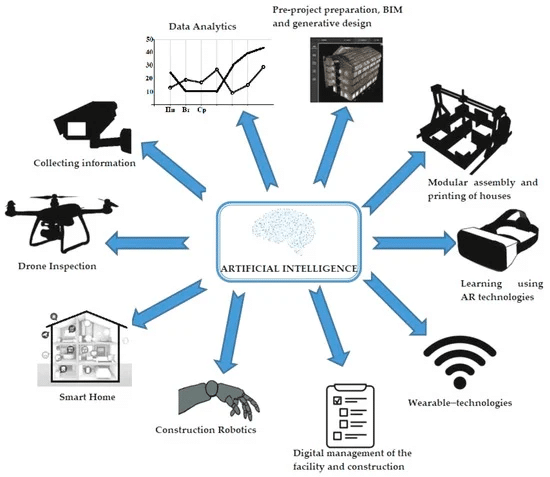AI in Real Estate: Smart Investments, Benefits & Cases
In real estate, the impact of AI is especially profound. Traditionally reliant on manual processes and intuition, the sector is embracing data-driven technologies to improve efficiency and accuracy. Real estate AI companies are leveraging AI-powered tools to analyze property values, predict market trends, and streamline transactions in ways that were impossible before. A McKinsey report highlights that real estate companies using AI see a 10% or more increase in efficiency, allowing them to close deals faster and with greater confidence.
AI-driven platforms also enhance customer experiences through personalised property recommendations, virtual tours, and chatbots for instant support.
Buyers and investors want more than location insights; they seek predictive analytics on property appreciation, rental yields, and risk factors. AI is indispensable because it turns millions of data points into actionable insights in seconds. For instance, Zillow’s Zestimatetool uses AI to provide near-instant property valuations, aiding buyers and sellers alike. Moreover, AI enhances urban planning by helping developers choose locations with potential growth. With the global real estate market projected to peak across all three regions, with the largest percentage growth in markets, the need for AI solutions to optimize decision-making and stay competitive is only increasing.
Role of Using AI in Real Estate

Source: https://solguruz.com/blog/role-of-ai-and-ml-in-transforming-the-real-estate-sector/
AI for real estate investment is changing the industry by processing large amounts of data, forecasting trends, and optimizing operations. Traditionally, real estate decisions relied on manual research, intuition, and limited historical data. AI for realtors changes this by quickly analyzing data from multiple sources, such as property records, market trends, buyer preferences, and economic indicators.
For example, AI can evaluate millions of property listings and compare them against historical sales data to provide accurate pricing. This helps buyers find better deals and ensures sellers price their properties competitively. In forecasting, AI uses historical trends, economic data, and local developments to predict property demand, market changes, and future growth areas. Companies leveraging AI tools report up to 20% faster decision-making, reducing guesswork and enhancing profitability.
AI vs Traditional Methods

Source: https://www.mdpi.com/1424-8220/23/21/8740
Traditional real estate methods often involve time-consuming tasks like manually reviewing documents, estimating property values, or conducting physical inspections. These methods can lead to errors and inefficiencies due to human limitations.
AI-based strategies, on the other hand, are faster, more accurate, and scalable. Machine learning algorithms analyze vast data sets to produce precise property valuations in seconds. The web development company use AI tools to automate repetitive tasks like document analysis, saving time and minimizing errors. A study by Deloitte found that AI-enabled real estate firms achieve 30-40% higher efficiency in operations than those using traditional methods. The scalability of AI also allows firms to manage multiple properties or projects simultaneously, something traditional methods struggle to achieve.
Key AI Technologies in Real Estate
1. Machine Learning for Property Valuations

Source: https://tryolabs.com/blog/2021/06/25/real-estate-pricing-with-machine-learning–non-traditional-data-sources
To provide accurate property valuations, machine learning algorithms study past sales, neighbourhood trends, and market dynamics. Tools like Zillow’s Zestimate have made it possible for buyers and sellers to get instant pricing estimates that are more accurate than traditional appraisals.
2.Natural Language Processing (NLP) for Document Analysis

Source:https://quso.ai/social-media-terms/natural-language-processing
Real estate involves extensive paperwork—leases, contracts, and legal documents. NLP-powered tools, a real estate ai tools can read, extract, and analyze key information from documents, reducing processing time by up to 80%. This ensures compliance and reduces legal risks.
3. Computer Vision for Site Inspections and Design Optimization

Source:https://www.sciencedirect.com/science/article/pii/S0926580522003132
AI-driven computer vision can analyze images and videos of properties to detect damages, suggest repairs, or even optimize interior designs. It eliminates the need for frequent site visits, making inspections quicker and more reliable.
4. Generative AI for Listing Enhancements and Market Trend Analysis

Source: https://www.leewayhertz.com/ai-in-real-estate/
Generative AI can create engaging property descriptions, highlight key features, and even suggest staging ideas for listings. It can also simulate various market scenarios to help developers and investors plan more effectively.
How is AI Boosting Smart Investments?

Source: https://appinventiv.com/blog/ai-for-investing/
Artificial Intelligence (AI) is transforming how people invest, offering smarter tools to analyze data, predict trends, and optimize portfolios. Here’s how AI is revolutionizing investment strategies, especially in real estate and financial markets.
1. Market Analysis & Trend Prediction
AI can process vast amounts of data in real time, helping investors identify market trends and make informed decisions. By analyzing historical data, news, and even social media, AI predicts price movements and market shifts with higher accuracy.
Example: AI can predict property price fluctuations by analyzing historical pricing trends, local development projects, and economic indicators. For instance, AI tools have helped investors in cities like San Francisco and Austin identify areas where property values are likely to rise due to tech industry growth.
According to a PwC report, 54% of businesses already use AI for predictive analytics in decision-making, proving its growing influence in forecasting.
2. Enhanced Property Valuation
Traditional property valuations rely on manual analysis, which can vary in accuracy. AI valuation models use large datasets to assess property prices more precisely, considering factors like neighborhood, amenities, and market trends.
Example: Zillow’s Zestimate uses AI algorithms to provide property value estimates. The platform analyzes data from millions of homes, including recent sales and local market conditions, to deliver real-time pricing updates. Zillow’s AI-driven tool processes over 3.3 terabytes of data daily to ensure its estimates are updated and reliable.
3. Investment Risk Management
AI helps identify risks in investment portfolios by spotting red flags that human analysts might overlook. It examines market volatility, loan default probabilities, and economic downturn patterns to help investors make safer decisions.
Example: An AI system can warn a real estate investor about a property’s potential risk by analyzing factors like its historical maintenance issues, local crime rates, or upcoming zoning changes that could impact its value.A McKinsey study shows that AI improves productivity by up to 30%, offering investors more confidence.
4. Portfolio Optimization
Balancing and diversifying an investment portfolio can be challenging. AI tools simplify this process by analyzing market trends and recommending asset allocations tailored to an investor’s goals and risk appetite.
Example: AI-driven platforms help Real Estate Investment Trusts (REITs) by optimizing their portfolios. They analyze rental income, occupancy rates, and geographic performance to suggest where to invest or divest.According to a Deloitte report, AI-based portfolio management tools reduce human error and increase portfolio efficiency by 40% in financial investments.
Top AI Tools in Real Estate

Source: https://dataforest.ai/blog/ai-in-real-estate-the-next-generation-of-capabilities
1. Residential Real Estate: Opendoor
Opendoor is the best AI for real estate to simplify the process of buying and selling homes. Sellers can receive instant offers by entering property details into the platform, while buyers can explore properties with personalized recommendations. AI algorithms evaluate home prices using factors like market trends, location, and property features.
Example: Opendoor’s AI helps sellers close deals 30% faster than traditional methods. In 2022, the platform analyzed data for over 70,000 properties in the U.S., streamlining transactions for homeowners.
2. Commercial Real Estate: SpaceIQ
AI tools like SpaceIQ optimize commercial spaces by analyzing how buildings are used. They provide insights into tenant behavior, recommend space layouts, and predict maintenance needs. This helps property managers save costs and improve tenant satisfaction.
3. Real Estate Marketing: Convoboss for Chatbots
AI-powered chatbots like those using Convoboss is an AI for real estate marketing revolutionize real estate marketing. They engage potential buyers 24/7, answer questions, and provide personalized property recommendations. AI for real estate agents focus on high-potential clients.
Example: A real estate agency using chatbots increased lead conversions by 40% by offering tailored property suggestions based on user interactions
4. Urban Planning: Sidewalk Labs
Sidewalk Labs, a subsidiary of Alphabet, uses AI to design smarter cities. The platform analyzes data on traffic, energy use, and population growth to create sustainable urban plans. It helps city planners make data-backed decisions for long-term development.
Example: In Barcelona, the citizen-centered approach reduce energy consumption by 20% using AI-driven data insights.
5. Predictive Maintenance: Building Engines
AI tools like Building Engines identify potential maintenance issues before they become costly problems. By monitoring building systems and analyzing historical data, these tools improve efficiency and reduce downtime.
Example: Building Engines helped property managers can build cost effectiveness by 15% by predicting HVAC system failures in advance.
Benefits of Using AI in Real Estate

Source: https://radixweb.com/blog/ai-in-real-estate-industry
1. Improved Decision-Making
AI processes large amounts of data quickly, helping real estate professionals and investors make better decisions. AI tools analyze market trends, property prices, and buyer preferences to provide accurate predictions for future outcomes.
Example: Investors use AI platforms to predict which neighborhoods will see property value growth based on factors like job market trends, infrastructure projects, and historical data. Zillow’s Zestimate, for instance, provides real-time property price estimates, enabling faster decision-making.
2. Cost Savings
AI reduces operational costs by automating repetitive tasks like tenant screening, property listings, and maintenance scheduling. AI-powered systems can detect maintenance issues before they escalate, saving property managers money on repairs.
3. Increased Transparency
AI reduces human bias by relying on objective data for valuations and decisions. This ensures accurate property pricing and fairer negotiations between buyers and sellers.
Example: AI valuation models like HouseCanary analyze millions of data points, offering transparent and unbiased property evaluations for lenders, buyers, and realtors.Accurate valuations improve trust in real estate transactions, especially for first-time buyers.
4. Enhanced Customer Experience
AI enhances the home-buying experience by providing personalized recommendations and virtual property tours. Chatbots answer customer queries 24/7, while tools like virtual staging help buyers visualize their future homes.
Real estate agencies using AI chatbots saw a 25% increase in customer engagement. AI-powered platforms like Matterport allow buyers to take 3D virtual tours of homes from their devices.More than 42% of homebuyers prefer virtual tours before physically visiting properties, according to a National Association of Realtors report.
5. Sustainability
AI helps create energy-efficient buildings and promotes eco-friendly practices. Smart systems monitor energy use, optimize lighting, and manage HVAC systems to reduce waste.Buildings with AI-driven energy management systems save an average spent on utility costs.
Challenges in AI Adoption

Source: https://codiant.com/blog/ai-in-real-estate-industry-a-transformative-revolution/
While AI offers immense potential in real estate, its adoption comes with significant challenges. Let’s explore the key hurdles in detail:
1. Data Privacy Concerns
AI relies heavily on data, including sensitive customer information like financial details and preferences. Ensuring this data is protected is crucial to maintaining trust. Data breaches or misuse of personal information can lead to serious consequences, including legal actions.
A real estate platform using AI to analyze customer data for property recommendations must comply with data protection laws like GDPR in Europe or CCPA in California. Failure to do so can result in hefty fines.According to a Deloitte report, 92% of companies cite data privacy as a major challenge in adopting AI technologies.
2. High Initial Investment
Implementing AI requires significant upfront costs for infrastructure, software, and skilled professionals. For smaller real estate businesses, these costs can be a barrier.
Building an AI-powered predictive analytics tool to assess property values involves purchasing advanced software and hiring data scientists, which can cost tens of thousands of dollars. A McKinsey; survey found that high costs deterred 41% of companies from integrating AI into their operations.
3. Resistance to Change
Real estate is traditionally a human-centric industry. Agents and managers accustomed to traditional methods may resist AI-driven solutions, fearing they might lose their jobs or struggle to adapt.A real estate agency introducing AI-powered chatbots faced pushback from agents who felt it would reduce the need for personal client interaction.
Harvard Business Review states that over 80% of AI initiatives fail due to organizational resistance and lack of alignment with AI real estate companies culture.
4. Skill Gap
Using AI tools effectively requires expertise in data analysis, programming, and construction AI software management. Many real estate professionals lack the training needed to leverage these technologies, creating a skill gap.A real estate firm adopting using AI in construction struggled to make the most of them because staff didn’t understand how to interpret the data insights.
Skill gap as the biggest barrier to AI adoption. Training programs and hiring AI specialists are critical to overcoming this challenge.
Case Study: Using AI in Real Estate

Source: https://www.facebook.com/magicbricks/posts/10159308252512029/?_rdr
MagicBricks, a leading property portal in India, has introduced PropIndex, an AI-driven tool that provides real-time property price indices. By analyzing extensive data from property listings, user activities, and market trends, PropIndex offers valuable insights into property rates and market conditions.
1. Challenges Addressed by PropIndex
- Data Overload: The real estate market generates vast amounts of data daily. Processing this information manually is time-consuming and prone to errors. PropIndex automates data analysis, ensuring timely and accurate insights.
- Market Transparency: Buyers and sellers often face challenges in understanding true market values due to inconsistent information. PropIndex provides standardized price indices, enhancing market transparency.
- Informed Decision-Making: Investors and homeowners need reliable data to make sound decisions. PropIndex delivers up-to-date market trends, aiding in strategic planning.
2. Impact of PropIndex
- Enhanced User Engagement: Since its launch, PropIndex has seen a significant increase in user interaction, capturing price movement for a city across different parameters such as supply and demand.
- Market Influence: Real estate professionals report that PropIndex’s data has influenced pricing strategies of property listings, leading to more competitive and fair pricing.
- Geographical Coverage: PropIndex analyzes data across multiple cities, providing localized insights that cater to diverse user needs.
A potential homebuyer in Mumbai used PropIndex to compare property prices across different localities. The tool’s real-time data revealed that certain suburbs had a lower price per square foot compared to others, guiding the buyer to make a cost-effective decision.
By leveraging AI, MagicBricks’ PropIndex has streamlined the real estate market, offering clarity and actionable insights to users, thereby transforming property transactions in India.
The Future of AI in Real Estate Industry

Source: https://aitglobalinc.com/ai-in-real-estate-industry/
Emerging Trends
1. AI-Powered Smart Contracts
AI and blockchain integration are paving the way for smart contracts in real estate. These digital contracts automate transactions, ensuring transparency, speed, and security. With AI analyzing contract terms, errors are minimized, and trust among parties improves.
Smart contracts are one of the examples of artificial intelligence in construction that can automate property sales, ensuring payments are made instantly when conditions like legal approvals are met. AI construction companies are leveraging this technology to eliminate intermediaries, reducing costs for buyers and sellers.2. Blockchain Integrations
Using AI in real estate combined with blockchain ensures secure and tamper-proof real estate records. This technology simplifies property title verification and reduces fraud.
Example: Countries like Sweden and Dubai are exploring blockchain-based property registries that AI can analyze for market trends and transaction history.
3. Generative Design Tools
AI is also transforming property design through generative tools. These systems create multiple design options based on a developer’s requirements, such as maximizing space or reducing energy use.
Example: A developer can input a plot’s size, budget, and sustainability goals, and AI generates optimized building plans that save time and resources.
Predictions for the Industry
1. Redefining Property Management
AI will automate routine property management tasks like tenant screening, rent collection, and maintenance scheduling. Predictive maintenance will further reduce costs by addressing issues before they escalate.
Example: Smart sensors powered by AI will monitor building systems, such as HVAC or elevators, predicting failures and scheduling repairs automatically.
2. Transforming Urban Planning
AI will play a key role in designing smart, sustainable cities. By analyzing population data, traffic patterns, and environmental factors, AI can guide urban planners in creating energy-efficient and livable spaces.
Example: In Singapore, AI-driven models are already being used to predict the impact of new developments on traffic flow and energy demands.
3. Global Real Estate Market Expansion
AI will make real estate investing accessible worldwide by breaking down geographical barriers. Virtual property tours, AI-based valuations, and language translation tools will allow buyers to explore and invest in properties across borders.
Example: Platforms like Matterport and AI valuation tools are using AI in construction software enabling international buyers to confidently purchase properties without physical visits.
Conclusion
The integration of AI in real estate and construction is no longer a futuristic concept but a present-day reality reshaping how investments are made. By leveraging estate AI cost-efficiently, professionals can gain actionable insights into market trends, optimize property portfolios, and predict risks with remarkable accuracy. The use of AI in construction is revolutionizing the sector, enabling developers to design smarter, more sustainable spaces. For instance, examples of artificial intelligence in construction, like generative design tools, have helped architects.
If you’re considering entering the market or enhancing your current strategies, using AI in real estate can be a game-changer. However, to truly harness its potential, it’s crucial to work with experts who understand the technology and its applications deeply. Partnering with AI specialists or firms skilled in software development ensures you’re maximizing its benefits—from automated property management to intelligent design and analytics.
SHARE THIS POST













